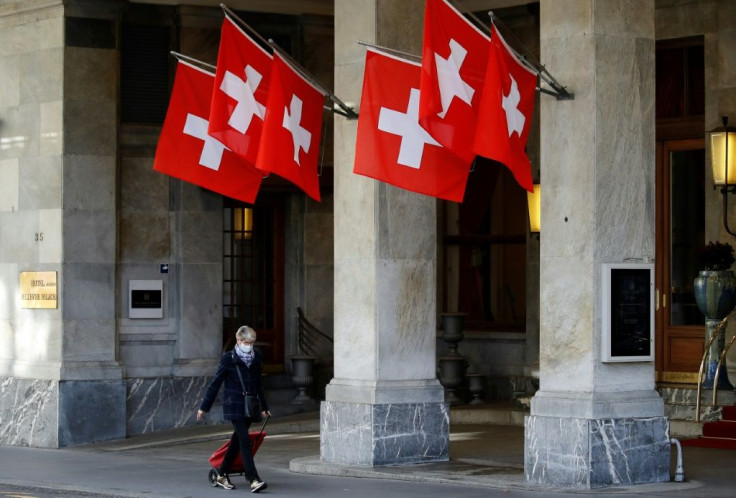EU Urges Swiss 'Compromise' To Break Deal Impasse
European Union chief Ursula von der Leyen called for "flexibility" as talks with Switzerland's president on Friday failed to make a breakthrough towards sealing a long-delayed cooperation agreement.
Brussels has made no secret of its growing impatience to nail down a "framework agreement" to unify a patchwork of accords with Bern, 13 years in the making.
But the two sides remained at an impasse after the EU refused to budge on demands from Swiss leader Guy Parmelin to exclude key issues relating to state aid, wage protections and freedom of movement from the pact.
"Our position is different -- it is that obviously you cannot carve out such three fundamental areas from the agreement," EU spokesman Eric Mamer said after the 90-minute meeting.
Mamer said the EU had put some "compromises" on the table and wanted them to form a basis for any future talks.
"Our doors are open and at any point in time the Swiss side can contact us and we can continue the discussion," he added.
Talking before the meeting, von der Leyen insisted that it was possible to reach a deal if there was "some flexibility on both sides".
"In a negotiation, the final metres are the most difficult," the European Commission president said.
Parmelin admitted there were "substantial differences" between the two sides and insisted he was trying to get an "acceptable agreement" that would stand up to scrutiny back home.
"We agreed to stay in contact," he said.
For the EU, the negotiations on the deal concluded in 2018 -- but the Swiss have continued to press for changes and have so far balked at signing.
The agreement would rejig five major agreements within 120 bilateral accords that govern non-EU member Switzerland's relations with the bloc.
Among other points, they touch on access to the single market and fine-tuning applicable Swiss and EU laws.

Fears abound that failing to secure the framework deal could jeopardise Switzerland's relationship with its largest trading partner at a time when more than half of all Swiss exports go to the bloc, which all but surrounds the landlocked country.
Declarations that the deal was nearly dead have multiplied in recent months.
Some hope of a comeback was restored with a report in Switzerland's Blick newspaper this week suggesting Bern would offer easier access to Swiss residence permits for people from newer EU member states in eastern Europe in exchange for a fresh revision of the deal.
While not really comparable to Brexit, Switzerland would face significant consequences if the framework agreement falls through.
Since 2008, the EU has insisted Switzerland must sign the agreement before concluding any new bilateral deals.
Switzerland's leader faces pressure from the economic and financial sectors to save the deal -- and demands from opponents to not cave in to the EU.
Parmelin is from the populist right-wing Swiss People's Party. Switzerland's largest political party has for years led efforts to resist closer ties with the EU, and has described the framework agreement as a "Diktat from Brussels".
There are also calls for the agreement to be put to a referendum, in keeping with the direct democracy system in the small, Alpine country.
The overarching accord would require revising five existing bilateral agreements on free movement, industrial standards, agriculture, air and land transport -- and the creation of a joint arbitration court that could enable compensation for breaches.
It would also require the creation of an arbitration court to settle differences between the two sides.
Bern has continued to ask for clarifications on three points: Swiss wage protection, state subsidies and a directive that would give EU citizens in Switzerland the same rights to social security benefits as Swiss citizens.
So far, Brussels has said it is willing to provide clarifications on certain points, but has ruled out any renegotiations.
© Copyright AFP 2024. All rights reserved.





















